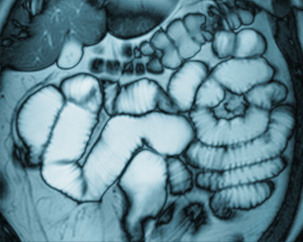
MR-Enterographie zur Darstellung des Dünndarmes
MR enterography of the small intestine
With chronic inflammatory disease of the small intestine, regular examination of the intestine is unavoidable. Because many patients are very young and therefore live with the disease for a long time, it is essential to keep total radiation exposure low.
Obtaining images of the small intestine by means of MR enterography involves very little radiation exposure for you as a patient, because it is not necessary to insert a probe, as is the case with fluoroscopy. However, you do have to fast for 4 hours before the examination.
For this examination, you should arrive at the center approximately one hour before the procedure begins.
You will then be given one liter of fluid to drink (Mannitol). It takes some time for the fluid to fill the entire small intestine.
Immediately before the examination, the administration of a contrast agent via a vein is required. A drug is often administered in order to sedate the intestine (Buscopan).
In addition to changes in the intestinal wall, those in the region of the intestine can also be assessed. Fistulas, abscesses, and lymph nodes can be detected well.
Drinking the Mannitol solution causes mild diarrhea. You should take that into account when planning your activities and making appointments.
